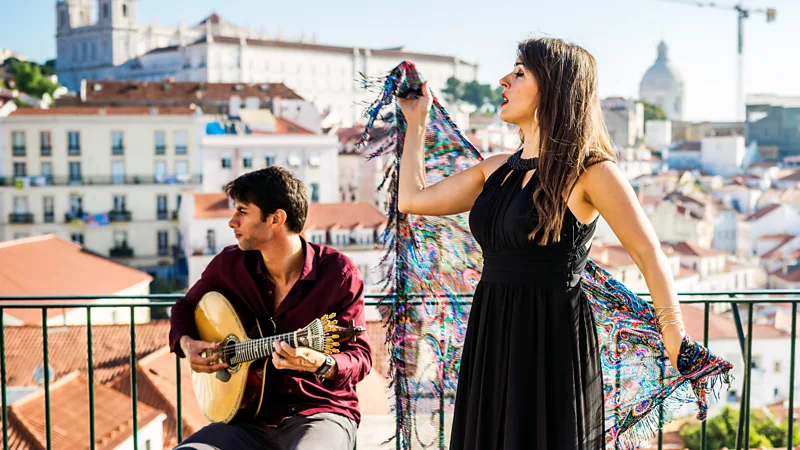A fadista's guide to Lisbon's best live fado performances
Fado singer Carminho wowed audiences with her performance in Poor Things. Here's where she catches fado in Lisbon, from the iconic Mesa de Frades to insider hangout Tasca da Bela.

Lisbon captivates with its multitude of sensory delights, whether it’s the zesty fragrance of ginger lilies in one of the city's many gardens, the luscious sweetness of pasteis de nata custard tarts or the stunning brilliance of lavender-hued jacaranda blooms in a town square. Set beside the cerulean waters of the Tagus River, Lisbon's seven-hilled landscape beckons to be explored on foot, with discoveries around every corner.
Fado singer and songwriter Carminho was born into the world of fado. Growing up in Lisbon, she regularly listened to illustrious fadistas such as Beatriz da Conceição and sisters Amália and Celeste Rodrigues – in the fado house her parents owned. Carminho has released six albums, with her first reaching platinum.
The very soul of Lisbon and its citizens is captured in fado. This musical genre – often described as haunting or mournful – reflects the bittersweet emotions of everyday life. But fado doesn’t just refer to a genre; it also refers to songs that traditionally revolve around themes like love and pain. No wonder, considering fado was born in Lisbon’s poor and marginalised neighbourhoods; once home to sailors and prostitutes. The soul-stirring refrain can be heard and experienced in fado houses all over the country, where understanding Portuguese isn't a requirement for soaking up the music's emotion.
Fado has been Portugal's constant soundtrack since the 19th Century but is currently having a moment in the global spotlight, featured in the Oscar award-winning film Poor Things. Lisbon-native Carminho, a renowned fadista (fado singer) and composer, has a captivating cameo role where she sings and plays the traditional 12-string Portuguese guitar while the lead character, Bella (played by Emma Stone) listens, overwhelmed with feeling.
The daughter of highly respected fadista, Teresa Siqueira, Carminho has fado in her blood and represents a new generation of fadistas. "Fado is a living language," she says. "You keep and learn from the tradition, and then, in my case, I interpret through my generation and my experiences. I use fado to express myself."
1. Best for hospitality and excellent Portuguese cuisine: O Faia
Carminho's first fado house pick is O Faia in Lisbon's bohemian Bairro Alto neighbourhood. "This is a fado house with a huge reputation and a great history," says Carminho. Open since 1947, "it was managed by one of the greatest fado singers of all time: Lucilia do Carmo and later by her son, Carlos do Carmo. Many fado singers like Amália Rodrigues and Alfredo Marceneiro have passed through here."
The singers who perform here are regulars. "I especially go to listen to two of the greatest fado singers currently active, António Rocha and Lenita Gentil," says Carminho. Though it’s a good place for groups, Carminho says that couples will particularly enjoy the atmosphere, where the space is bedecked with candlelight during performances.
Carminho also likes O Faia for its culinary offerings. "This house has one of the best restaurants in Lisbon with a menu inspired by traditional Portuguese cuisine but with chef Pedro Pereira's own signature," she says. "For starters, I suggest the pickled mackerel or veal terrine; for the main course, the skate fish or the roasted lamb leg." She cites the impeccable hospitality as yet another draw. "The current managers are an incredibly dedicated family to this house and to fado. The father and the two sons run the house, and one of the two brothers plays the bass guitar."
2. Best for a traditional atmosphere and fado stars: Sr Vinho
Named for a famous fado sung by one of the house’s founders, fadista Antonio Melo Correia, Sr Vinho hosts high-quality performers from Monday to Saturday. "Among them is the great fado singer Maria da Fé, who is present almost every day of the week," says Carminho. Due to the venue's stellar reputation, guests will find former resident fado singers who have become big stars, such as Aldina Duarte and Antonio Zambujo. "The presence of Maria da Fé gives the place the solemnity and mystique [it deserves]," says Carminho.
"Visitors should enjoy Lisbon by walking; that's what I do," says Carminho, who loves strolling along the river, starting at the Cais do Sodre neighbourhood. From there, it's only 15 minutes to Casa dos Bicos. "Casa dos Bico is a historic building that's architecturally interesting – it has spikes on the facade – and it honours Jose Saramago, who won the Nobel Prize for Literature."
Ambling one mile south from the river brings you to Jardim do Torel, one of Lisbon's many delightful gardens (("parks", so we don't repeat gardens?)). "You can lay out your picnic blanket in this garden… you’re surrounded by palaces," says Carminho. End your tour by meandering about 40 minutes to Casa Fernando Pessoa, a museum honouring one of Portugal's greatest poets. "You can see a trunk of Pessoa's poems, his notes, bedroom, even his glasses," says Carminho.
With wooden furnishings, historically significant art and Portuguese azulejos (tiles) on the walls, the vibe is traditional yet sophisticated. "Arches create corners and give the house a mysterious and romantic atmosphere," says Carminho, who enjoys sitting at the table in the back facing the central arch where the fado singers perform. Many Portuguese people, including groups, visit this fado house. "But due to the layout of the room, the feeling is that of being in a cosy, intimate space," says Carminho.
3. Best for an intimate, relaxed spot: Tasca da Bela
Its red walls hung with musical instruments, lace curtains, icons of saints and ceramic dishware, Tasca de Bela is managed by Bela, a renowned figure in Lisbon's fado scene who plays triple threat as the venue's owner, cook and host. "She’s a lover of traditional Portuguese food and a lover of fado," says Carminho. The menu is prix fixe and may include such dishes as Nisa cheese or other snacks; hot items such asstewed veal with coriander rice, and pumpkin and walnut jam tart or other desserts.
"This is a place where fado singers gather and where we can listen to very good fado, which is quite traditional," says Carminho.
Both Portuguese and foreign tourists frequent this fado house and enjoy its relaxed vibe. "But when the fado starts, there can’t be a peep," says Carminho. "It’s a tight space, and I really like the atmosphere created by the fact that we’re sitting at a table with other customers." Carminho says that every table in the room is good, "but there’s a more romantic table by the window".
4. Best for hearing Caminho’s famous fadista mother perform: Maria da Mouraria
Located in Mouraria, Lisbon's former Moorish Quarter, Maria da Mouraria Casa de Fados is situated at the end of Rua do Capelão, a legendary street that often pops up in fado lyrics. "It’s believed that this was the House of Maria Severa, who many say was the first recorded fado singer," says Carminho. "She has become mythical in fado and in the city of Lisbon."
Owned by prestigious fado singer Helder Moutinho, Maria de Mouraria channels a contemporary interpretation of a traditional Portuguese house "with chequered tablecloths and flowers in the windows", says Carminho. It’s a snug space – especially good for couples – and Carminho says she likes feeling close to the fado singers and musicians while they perform. She likes to plant herself at her favourite table by the window because of the comfortable, cushioned sofa that offers a view of the entire house and the atmospheric square outside. "On summer nights, dinner and fado take place in that square, outdoors," she says.
Though it’s open Wednesday to Sunday, Carminho always goes on Saturday; "the day my mother regularly sings". Siqueira has been a regular here since the beginning; in addition; Helder Moutinho himself usually performs several times a week.
5. Best for rubbing shoulders with renowned fadistas: Mesa de Frades
Once part of a palace, Mesa de Frades takes its name from its previous life as a chapel (frades means friar in Portuguese). It's also where Carminho sang twice a week for eight years until 2010. The tiny interior coated with 18th-Century tiles depicting religious scenes has an almost mystical feel, transporting guests back in time. "During the fado performances, the lights dim and the candle flames fill the atmosphere," says Carminho. "The reputation of this house is that of a well-kept secret, where you can listen to the best fado and encounter some of the most important figures of fado sitting at a table. It's a place where many musicians and fado singers go after finishing their own nights in other fado houses."
Carminho's favourite day to visit Mesa de Frades is on a Wednesday, when her brother – fado singer Rodrigo Rebelo de Andrade – performs. "The atmosphere is tranquil and warm," she says. "Ask to sit in the entrance room where you'll be closest to the fado singer and the musicians."
After dinner, "you can knock at the door for drinks," says Carminho. "You never know if it's going to be full or empty, but it's worth taking the risk."
-bbc







